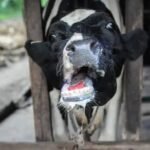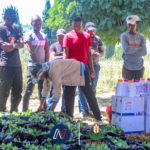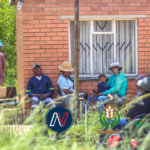The Food and Agriculture Organization of the United Nations (FAO) has financed AgrInvest, an initiative that stripped bare the real issues of Lesotho’s agriculture sector.
At a time when the livelihoods of over 60% of Basotho hinge on agriculture — and yet the sector contributes less than 8% to national GDP — the future of Lesotho’s food systems hangs in the balance, with over 700 000 Basotho facing food insecurity.
However, through the bold, multi-stakeholder AgrInvest Lesotho initiative, the country is repositioning agriculture as an engine of economic recovery, job creation, and inclusive growth.
Launched in 2021 and concluded in late 2023, AgrInvest Lesotho is a transformative technical cooperation project implemented by the Ministry of Agriculture and Food Security with support from the FAO under project code TCP/LES/3802.
With a modest FAO contribution of USD404, 000 (M 7,5million), AgrInvest has delivered something many large-scale programs often fail to do, a pragmatic, policy-driven blueprint for value chain development that directly engages farmers, youth, women, civil society, and the private sector.
Lesotho’s economy has undergone significant structural changes in the past 30 years, once dominated by agriculture and government services, it is now largely driven by manufacturing and retail.
Despite this shift, agriculture remains the primary livelihood for the rural population, yet smallholder farmers remain largely excluded from mainstream economic activity.
The National Strategic Development Plan II (NSDP II) highlighted these gaps, including the lack of commercialisation and diversification among small-scale producers, exclusion of rural producers from modern value chains, and absence of an enabling environment for private sector collaboration.
AgrInvest was then designed as a direct response to these challenges.
Its primary goal accoeding to the concept note was to increase private investments in agrifood systems and create an inclusive, sustainable, and competitive sector.
“The project centred on policy transformation and development of Sector Development Plan Agreements (SDPAs), mobilising stakeholders through the AgrInvest Multistakeholder Platform (MSP), conducting commodity value chain analysis and prioritisation, institutional and capacity building, promoting gender and youth inclusivity, and building sustainability through global linkages like the FAO Hand-in-Hand Initiative,” the concept note explained.
It clarified that at the heart of AgrInvest’s strategy is the development of SDPAs, legally recognised, commodity-based strategic documents that guide investment and policy action in key value chains.
“Originally targeting nine value chains, the project completed and validated four SDPAs for poultry, piggery, pulses, and potatoes,” the FAO produced document said.
It added, “A fifth SDPA for vegetables was still under development by project end and is recommended for finalisation.”
FAO indicated that the SDPAs were co-created with sector actors through intensive consultations, field assessments, and technical analysis.
“They identify strategic investment areas, outline public and private roles, and define development outcomes including employment creation, income generation, and food security.
“AgrInvest used data-driven criteria to prioritise value chains based on domestic demand, production competitiveness, and potential to reduce poverty, hunger, and unemployment,” FAO said, noting that the profiling process identified more than 20 structural and systemic limitations across the value chains, including weak governance in producer associations, inadequate financial services, poor market integration, and policy fragmentation.
“The project focused on four value chains with immediate potential for investment and reform,” FAO noted citing AgrInvest stood out for its deliberate inclusion of traditionally marginalised voices, particularly women, youth, and smallholder farmers.
“In all stakeholder consultations, over 38% of participants were women, with active participation from organisations such as Farm Girls, Farmers on Heels, Girls-led Action on Climate Change, and Black Boer. These groups influenced SDPA content, advocating for gender-responsive investment strategies, market access for women-led agribusinesses, and climate-resilient inputs and extension services.
“Youth groups too emphasised the need for decent job creation across value chains,” FAo said.
It indicated that AgrInvest also empowered the Department of Planning and Policy Analysis (DPPA) to coordinate national consultations, work with technical consultants, and engage private stakeholders.
“As a result, Lesotho’s Ministry of Agriculture has drafted the Comprehensive National Agriculture Policy (2022–2026), strengthened analytical capacity to lead future value chain assessments, and created a governance model for agrifood system transformation.”
The AgrInvest Multistakeholder Platform (MSP) was institutionalised with a Terms of Reference (ToR) and coordination framework, including institutions such as Lesotho National Dairy Board, Lesotho National Development Corporation, and Basotho Enterprise Development Corporation.
“Although AgrInvest did not directly introduce new technologies, it embedded climate-smart principles and promoted environmentally viable value chains. Policy tools proposed in SDPAs are expected to reduce environmental degradation and enhance soil and water use efficiency. The initiative provided a blueprint for blending public and private capital into value chains, with government acting as a facilitator.
“As a result, new public-private partnerships are under consideration, and financing cases for poultry, pulses, and potatoes are being prepared for the Hand-in-Hand Investment Forum,” FAO said.
It stressed that the groundwork has already inspired local actors such as LENAFU, which has begun hosting its own dialogues to explore employment within the potato value chain.
AgrInvest aligned itself with a rights-based approach by advocating policies that ensure access to nutritious food, fair wages, decent working conditions, and equal opportunity, especially for women and youth.
Despite its achievements, the project’s final evaluation identified areas requiring further attention.
“The vegetable SDPA remains a national priority. Signing and endorsement of all SDPAs by high-level government officials is pending, and integration of SDPAs into the National Budget Framework is critical for implementation.
“Dedicated financial mechanisms, including catalytic grant facilities or investment guarantees, are needed to de-risk private sector participation,” FAO suggeste.
It called for continued high-level policy advocacy, suggesting that the Ministry of Agriculture champion the SDPA model as a core component of national development.
“Lesotho stands at a crossroads. The failure to unlock the economic potential of agriculture has long been blamed on farmers, rain, or markets, but AgrInvest has proven that the real issue is systemic misalignment, and that it can be fixed.
“With clearly prioritised value chains, evidence-based policies, empowered farmer groups, and a functioning stakeholder platform, Lesotho is now equipped to move from fragmented initiatives to coherent, investment-ready agricultural systems,” FAO said, suggesting that the success of AgrInvest is not just in what it produced, but in what it catalysed.
“It created space for dialogue, trust between public and private actors, and practical tools for real transformation, but the baton lies with the government of Lesotho, private investors, farmer organisations, and civil society.
“The blueprints are drawn. The platforms are ready. The moment is now. If Lesotho is serious about food sovereignty, youth employment, rural development, and sustainable growth, AgrInvest must not be treated as a closed chapter — but as the beginning of a new book in Basotho agriculture,” FAO noted.
Sources: AgrInvest Lesotho Final Report (TCP/LES/3802), FAO Lesotho, Ministry of Agriculture and Food Security.








